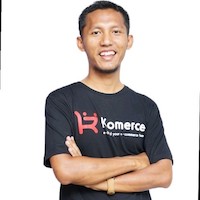E-commerce has provided opportunities for small and micro-enterprises to expand their potential customer base. However, not all small businesses have the capability to go digital. Indonesian startup Komerce (formerly Kampung Marketer) has capitalized on the trend and started providing e-commerce services to such small businesses by hiring talent from kampungs or small villages in Indonesia, particularly Purbalingga.
Komerce was founded in 2017 by its Chief Executive Officer, Nofi Bayu Darmawan, who left comfortable employment with the Ministry of Finance to return to his home town to elevate the community’s economic status through digital employment.
In this TechNode Global Q&A, we learn how Komerce is bridging the e-commerce gap for micro-enterprise, and how the company is also providing social impact by training and hiring from one of Indonesia’s rural towns, thus providing employment and growth opportunities whilst also providing affordable e-commerce skilled services to small businesses.
What are the three key industry challenges that Komerce is addressing?

The first challenge that SMEs find is that it is hard to scale up their business because they have limited time either to do or to learn digital marketing/e-commerce. So they need skilled talents to do it. However, they have limited resources to get skilled talents in the e-commerce field, where the salary is usually high.
The second challenge is that it is also hard for them to scale up their business because they need to rent an office, pay for the electricity, water, and internet bill. Their other option is to hire talents remotely as it is less expensive, but it is hard to manage. This becomes the third challenge they face.
How is Komerce addressing these industry challenges?
Simply, Komerce is a platform to connect SMEs with talented youth as an e-commerce team to grow their business through the internet in a remote setting.
As we are located in a small town, our minimum wage is lower than in the bigger cities. So, we offer a more affordable salary. Other than that, by collaborating with us, the SMEs don’t need to rent an office, pay for the internet and electricity bills as we provide a working space for the talents to work. Although we work remotely, the talents are monitored and assisted, and their performance will also be reported on a daily basis through the mobile apps.
What gives Komerce an edge in providing e-commerce services?
We provide skilled talents in digital marketing with an affordable salary, lower operational cost, flexible hiring depending on the business growth, and remote (talents are remotely hired but monitored, assisted, and reported). The users can collaborate with us as long as there is internet connection there. Our solution comes up in the form of collaboration, so our users need to send their devices here so that the village youth do not need to buy a device to work. When they stop the collaboration, we will send back the device.
Can you identify the trends driving innovation in e-commerce in Indonesia?
The online shopping trend in Indonesia has become something that may drive innovation. In Indonesia, the online shopping trend still needs humans to offer and respond to customers. In the future, probably the role of human beings will be different, and everything will be automatic.
However, we believe that as long as the role of human beings is needed in the e-commerce system, we need to keep learning and adapting to the trend of e-commerce. We keep updating the skills needed so that we will be able to provide relevant skills needed in the e-commerce field. We will train the village youth with those skills so that in the future, we can still sustain in this industry.
Featured image credits: Unsplash

